Key takeaways:
- Capital punishment raises ethical questions about justice and societal values, with arguments against it including the risk of wrongful execution and ineffectiveness as a crime deterrent.
- Forgiveness is presented as a powerful concept that challenges retributive justice and can facilitate healing for victims and communities affected by violence.
- Moving away from capital punishment opens up possibilities for restorative justice, which emphasizes rehabilitation and empathy, rather than punishment and violence.
- Engaging in discussions about forgiveness and justice may inspire societal change, fostering a culture of understanding and compassion.
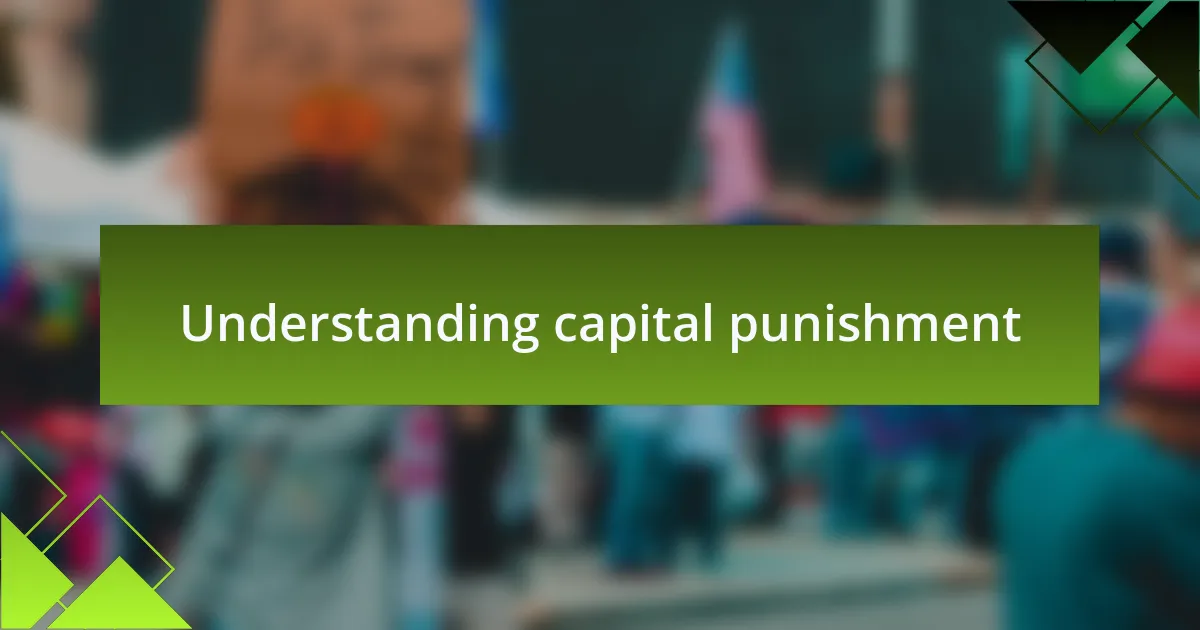
Understanding capital punishment
Capital punishment, often referred to as the death penalty, is an extreme legal measure where a person is executed as punishment for a crime, typically murder. It raises profound ethical questions that tap into the deeper values of our society. As I reflect on this, I can’t help but ask: what does it truly say about us as a civilization when we resort to such a final form of justice?
Throughout history, the justifications for capital punishment have varied widely, often influenced by social, political, and cultural factors. I recall a conversation I had with a friend who believed that capital punishment serves as a deterrent to crime. However, studies suggest otherwise, leaving me to wonder about the true effectiveness of such a practice. Are we really creating a safer society, or merely perpetuating a cycle of violence?
The emotional toll of capital punishment extends beyond the individual facing it; it affects families, communities, and society as a whole. I’ve often felt a sense of sadness when thinking about the loved ones of both victims and those on death row. How does one reconcile the narrative of justice with the immeasurable grief that accompanies it? Understanding capital punishment, I believe, requires us to delve into these complexities and confront the impact of our choices on humanity.
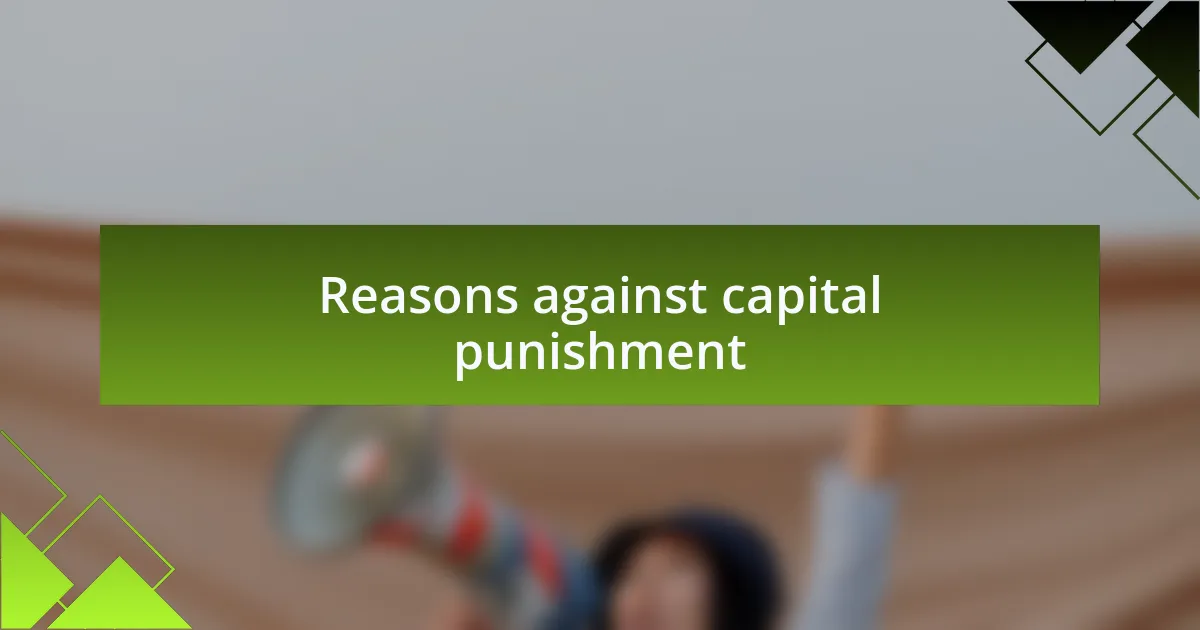
Reasons against capital punishment
One major reason against capital punishment is the risk of wrongful execution. Imagine being in a position where your life hangs in the balance, only to discover later that new evidence proved your innocence. I remember reading about cases where individuals spent decades on death row, only to be exonerated at the last moment. It makes me question: how can we accept a system that allows such irreversible mistakes?
Another argument against the death penalty relates to its ineffectiveness as a deterrent to crime. There’s a deeply rooted belief that harsher punishments will prevent others from committing similar acts, yet studies consistently show that states with capital punishment do not have lower crime rates. I find myself pondering whether our society is simply retracing the same steps, chasing after a myth rather than addressing the root causes of crime, like poverty and lack of education.
Lastly, the death penalty perpetuates a cycle of violence. I often reflect on the disturbing irony of a state-sanctioned act of killing being seen as a form of justice. When we choose capital punishment, are we not diluting the very values—compassion and rehabilitation—that we claim to uphold? It raises deep ethical concerns about the kind of society we wish to build, where vengeance overshadows mercy.
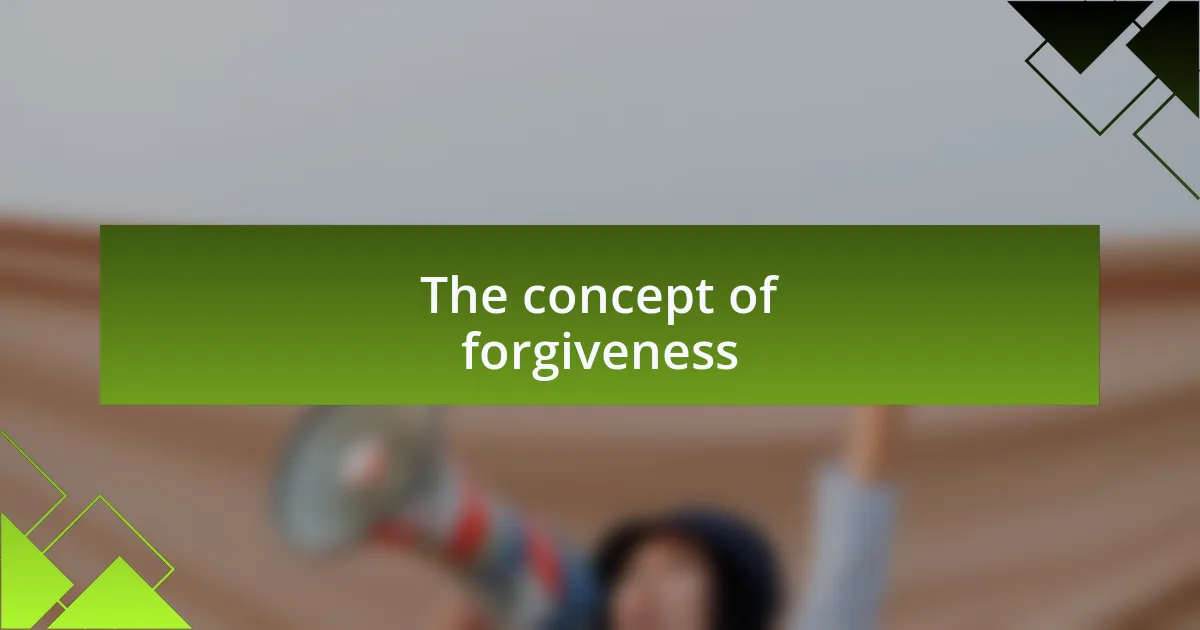
The concept of forgiveness
Forgiveness is a profound concept that often challenges our perceptions of justice and retribution. I remember having a conversation with a friend who shared a personal story about being betrayed by someone close to them. They struggled with the idea of forgiving, seeing it as a weakness rather than a strength. It made me realize that forgiveness isn’t about excusing wrongdoing, but rather about freeing ourselves from the burden of anger and resentment.
In the context of capital punishment, the idea of forgiveness becomes even more complex. Can we, as a society, truly forgive those who commit heinous acts? I wrestle with this question often. I believe that offering forgiveness, especially towards those who have caused immense pain, can be an act of power rather than submission. It challenges us to rise above our natural impulses for revenge and to consider a more compassionate approach to justice.
When I think about forgiveness, I wonder if it can coexist with the punitive measures we often advocate. For instance, how do we teach the concept of forgiveness if we simultaneously endorse an eye-for-an-eye mentality? I’ve found that discussions surrounding this duality evoke strong emotions and provoke thought. Our journey toward understanding forgiveness might just be the catalyst for healing a society plagued by violence and retribution.
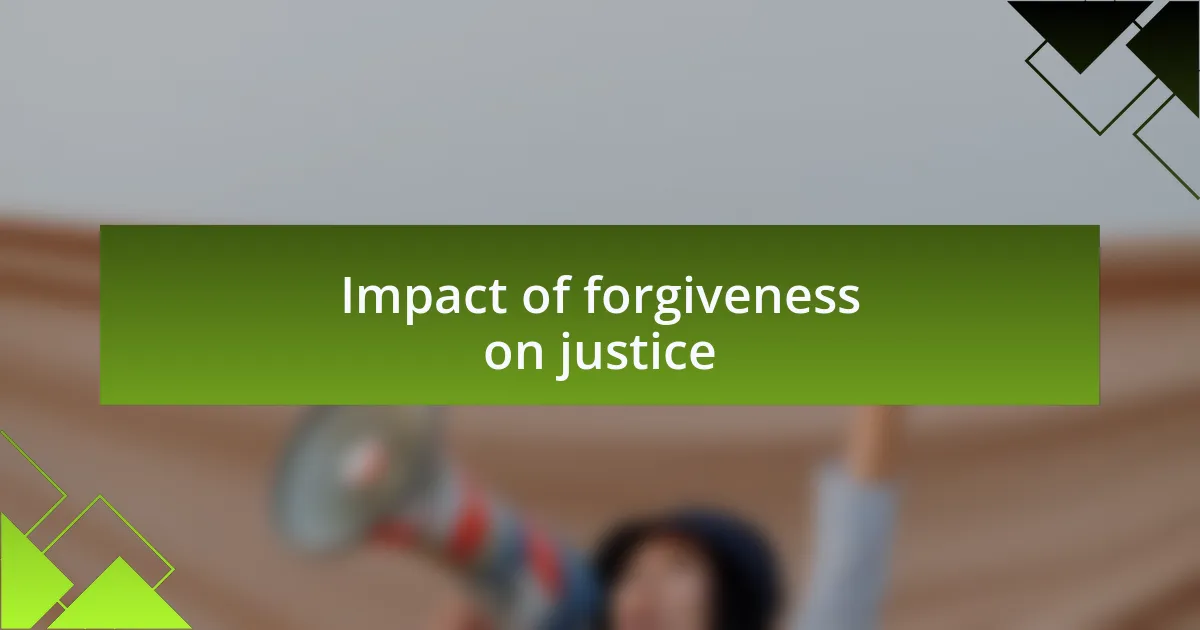
Impact of forgiveness on justice
Forgiveness holds a unique position in discussions about justice, particularly in the realm of capital punishment. I recall attending a community meeting where we debated the value of forgiving violent offenders. One participant spoke eloquently about how forgiving someone can pave the way for genuine healing, advocating that justice achieved through forgiveness focuses on restoration rather than mere retribution. It made me ponder whether true justice can ever be fully realized without an element of forgiveness.
In my own experience, I’ve seen how forgiving can transform pain into understanding. One time, I watched a close friend struggle to forgive a family member who had caused considerable trauma. Their journey illustrated that forgiveness does not exonerate the offender but rather liberates the victim from ongoing suffering. This perspective challenges the commonly held belief that justice must be punitive. Could it be that forgiveness leads us to a more equitable system where the crime is acknowledged, but so is the humanity of the perpetrator?
Consider the implications of forgiving on the justice system itself. If we could adopt a forgiving mindset, how might that change the way we approach punishment? Reflecting on this idea, I feel the traditional views on justice might need a re-evaluation. By integrating forgiveness into our understanding of justice, we could foster a system that emphasizes rehabilitation and reconciliation instead of exclusively punitive measures. The dialogue surrounding these concepts might be one of the most crucial conversations we have in redefining justice today.
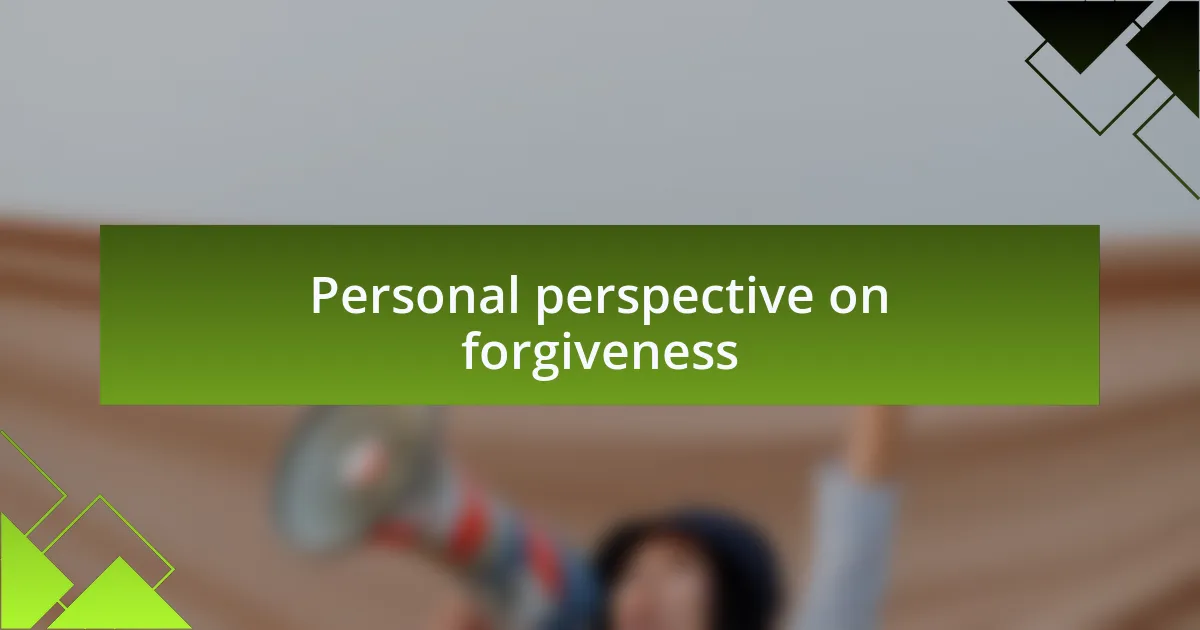
Personal perspective on forgiveness
Forgiveness, from my perspective, is a deeply personal journey. In a moment of reflection, I think back to when I lost a dear friend to violence. It took years for me to consider forgiveness for the perpetrator, an act that felt nearly impossible at first. I never realized that embracing forgiveness could uncover a pathway to my own healing, allowing me to honor my friend’s memory rather than remain tethered to anger.
The complexity of forgiveness often leaves me wondering about its limits. I find myself asking: can we truly forgive those who commit unspeakable acts? In my own life, I’ve encountered individuals who’ve suffered greatly, yet some managed to find a sliver of forgiveness in their hearts. Their stories serve as a powerful reminder that forgiveness doesn’t diminish the severity of a crime; instead, it acknowledges our shared humanity and can offer a way forward, even amidst overwhelming grief.
As I reflect on these experiences, I’m convinced that forgiveness touches on something fundamental about our nature. It’s intriguing to think that by embracing forgiveness, we might not only lift our own burdens but also inspire those around us to reevaluate their perceptions of justice. How can we foster a culture that embraces such transformative compassion? I believe that engaging in this internal dialogue is essential as we navigate the complex intersections of crime, punishment, and the possibility for healing.
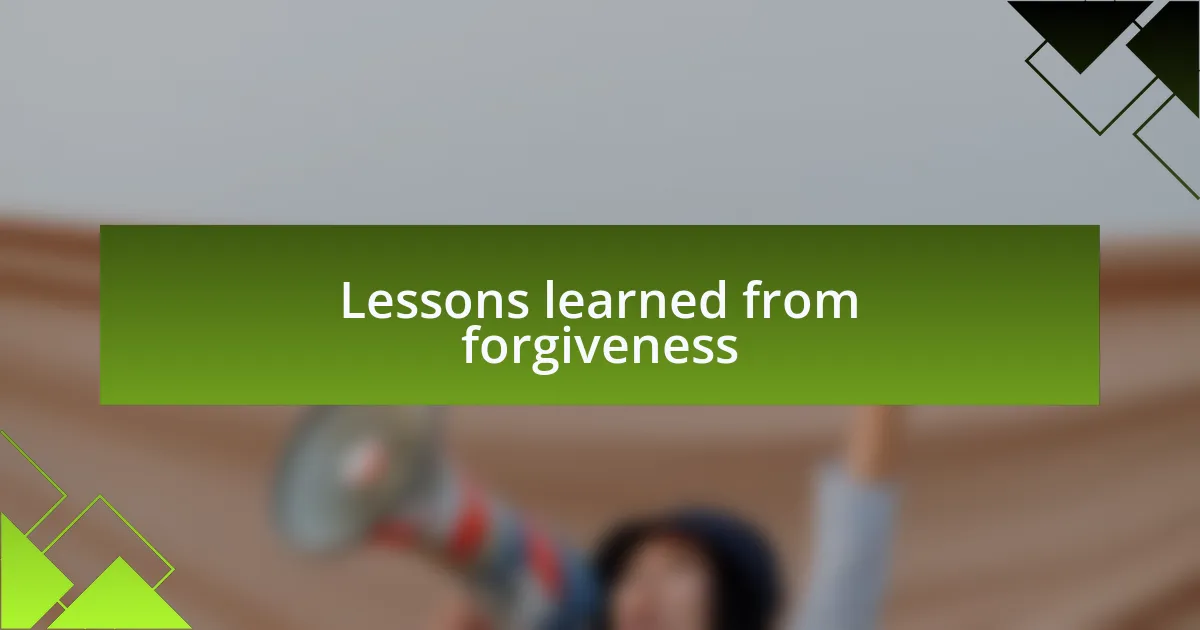
Lessons learned from forgiveness
Lessons learned from forgiveness
Forgiveness often feels like an insurmountable mountain, especially in the context of crimes that leave deep scars. I remember having a conversation with a survivor of violent crime who, despite her pain, spoke about how forgiving her attacker brought her an unexpected sense of freedom. It made me realize that forgiveness can sometimes transcend the act itself, freeing us from the shackles of resentment and allowing us to reclaim our lives.
Through my exploration of forgiveness, I’ve discovered that it often provides clarity, revealing how intertwined our stories really are. I met a man whose brother was a victim of a brutal murder. Instead of being driven by hatred, he sought to understand the circumstances that led to the crime. This approach was transformative, teaching me that instead of being defined by the tragedy, we can choose to let compassion shape our narratives, reshaping our emotional landscapes.
What fascinates me most is how embracing forgiveness can ripple outward, touching not just the individual but the larger community. I often ponder whether by sharing our forgiveness journeys, we might plant seeds of empathy in others. Isn’t it remarkable that a personal choice can ignite broader conversations about justice and healing? I’ve witnessed this firsthand when people open up about their stories; it creates a space where others feel safe to share their own wounds, encouraging communal healing.
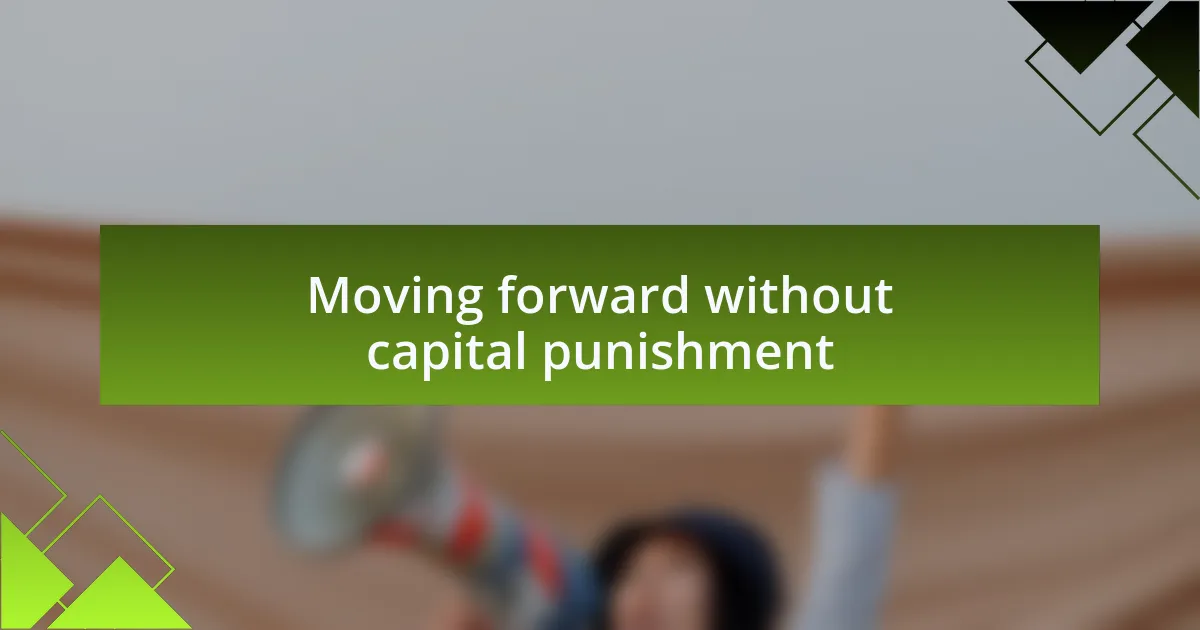
Moving forward without capital punishment
Moving forward without capital punishment opens up the possibility for restorative justice, which seeks healing rather than retribution. I recall attending a community forum where a former inmate spoke about his transformation after serving time. He emphasized how programs that focus on rehabilitation and reconciliation allowed him to find purpose and aid others, challenging the notion that some lives are better off ended. Isn’t it powerful to think that society can invest in redemption instead of destruction?
Another striking realization came from listening to families of victims who advocate against capital punishment. At a recent event, I heard a mother articulate her journey from anger to advocacy; she expressed that ending lives does not bring back her son, but healing the community can create lasting change. Her insight struck me deeply—what if we channeled our grief toward building a more compassionate future, where all individuals are valued and supported, rather than disposed of?
I’ve also observed how moving away from capital punishment encourages a societal shift toward empathy. In conversations with individuals affected by violent crime, I’ve found a common thread: many want to see solutions that address root causes rather than perpetuate cycles of violence. This has led me to wonder, can we cultivate a culture that prioritizes understanding, even in our most challenging circumstances? It seems to me that embracing this perspective not only honors those who have suffered but also lays the groundwork for a more just and humane society.